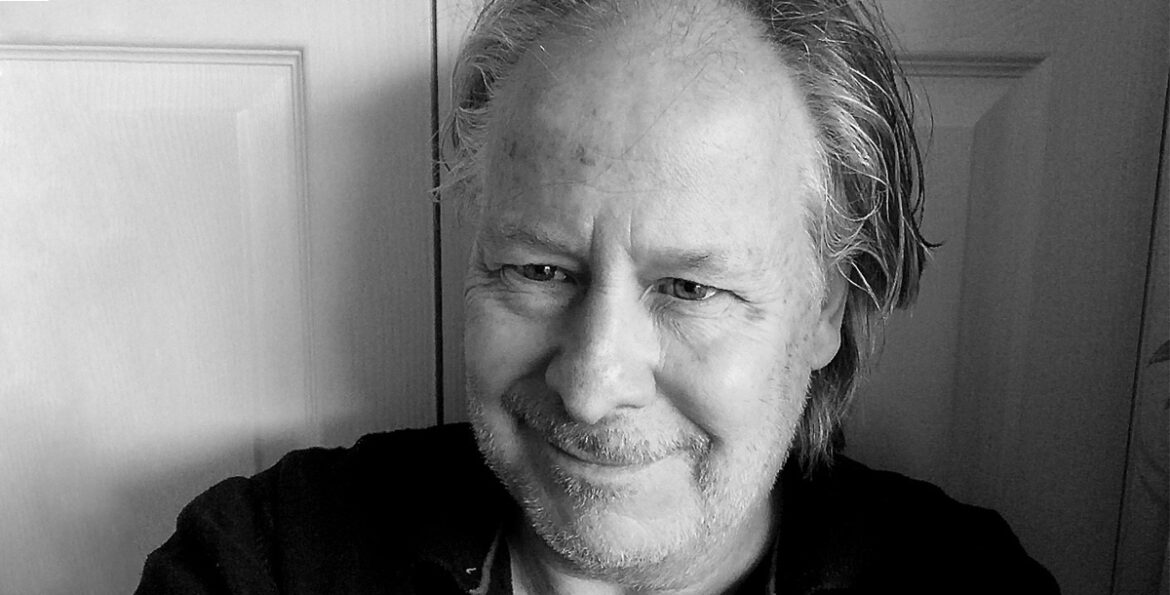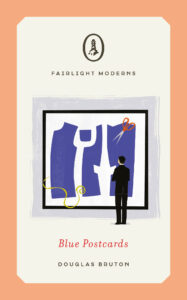

Douglas Bruton Interview
- 7th July 2021
- Category : Blog,Interviews & Blogs
Douglas Bruton is the author of Blue Postcards, a Fairlight Moderns novella publishing on 8 July 2021. Set in Paris, this atmospheric tale delicately intertwines three connected narratives and timelines, interspersed with observations of the colour blue. It is a meditation on truth and lies, memory and time and thought. It is a leap of the imagination, a leap into the void. Read this interview with Douglas Bruton to find out what inspired this novella.
How did you start writing and what does writing mean to you?
 I initially wanted to be an illustrator and had lots of ideas for books but couldn’t get anyone to write for me and couldn’t actually write anything worth reading myself. Too many crossings out and scribbled alterations. The mess on the page (which reflected the mess in my brain) inhibited my creativity – I blame my mother’s insistence on keeping everything neat and tidy. Then I discovered the computer and how pages always stay clean no matter how many changes you make to a page. That freed me up. I discovered then that writing expressed me better than any illustrations I did.
I initially wanted to be an illustrator and had lots of ideas for books but couldn’t get anyone to write for me and couldn’t actually write anything worth reading myself. Too many crossings out and scribbled alterations. The mess on the page (which reflected the mess in my brain) inhibited my creativity – I blame my mother’s insistence on keeping everything neat and tidy. Then I discovered the computer and how pages always stay clean no matter how many changes you make to a page. That freed me up. I discovered then that writing expressed me better than any illustrations I did.
Did you always want to be a writer?
I was a writer without talent at school. I tried to write a novel when I was seventeen. It went on for pages and pages… but I think it was pretty awful. I tried writing poetry at university but it was mannered and awkward. I knew books were important in my life but in my twenties I was resigned to being an avid reader. Then I sort of bumped into writing again when I was thirty years old, found I now could do it and haven’t looked back.
If you could describe Blue Postcards in one word what would it be?
The obvious word to choose would be ‘blue’; but maybe ‘lies’ would be a better word; if I could have two words then ‘blue lies’ would do. Blue lies are lies told for the benefit of the group or community – like telling children Santa’s real.
Was there a particular part of the story that you found difficult to write?
Not particularly. I write pretty intensely and the writing of Blue Postcards took about six days to complete. There was some research involved for the book – maybe a week or two of reading. For me writing is a journey of discovery – the same sort of journey as reading is. I write to find out where the story is going to go; I don’t really plan things out.
Blue Postcards has a unique format, each paragraph is number and postcard-sized. Why did you choose to write the narratives in this way?
I like experimental writing but at the same time I have a love of story. I read about Yves Klein sending out blue postcards to advertise his art show and I set myself the challenge of writing in postcard bites with each postcard being blue but at the same time telling a complete story (the three stories of Blue Postcards fit together like a jigsaw puzzle and hopefully work as a complete thing). I often set myself crazy writing challenges like this.
What inspired you to write Blue Postcards?
I had seen Yves Klein’s ‘A Leap Into The Void’ and understood it to be a fantastic lie; at the same time I think I was also appalled at the incredible lies of Trump. I read about Yves Klein and International Klein Blue (IKB) then wanted to write a blue thing. When I wrote the first postcards about the tailor I had no idea who he was or what his story would be – that just evolved. As for the ‘present day’ story, that came about because I wanted to ‘lie’ but at the same time tell you I was telling a big lie and for it to somehow have a truth to it too.
What do you think makes a good novella?
All the usual things – story, character, good writing.
What’s the most surprising thing you’ve learned from writing Blue Postcards?
I’m not sure I learned anything new from writing Blue Postcards. I always write trusting to the creative subconscious. I think I go into a trance almost and the writing just gets done. When I read back what I have written then I discover clever connections I had not been fully conscious of – as well as some more obvious ones that I had been conscious of.
What’s your favourite book and who is your favourite author?
This is perhaps the hardest question so far – to narrow down my reading to just one book! I rarely read books more than once but one book I keep returning to is Independent People by Haldor Laxness. The central character is just so strong and the world created so different from my own and so hard and punishing. The book is my go to summer holiday reading. I would also have to include Dubravka Ugresic’s The Museum of Unconditional Surrender – structurally quite experimental writing, extremely clever and beautifully written. Oh and Ocean Vuong’s On Earth We’re Briefly Gorgeous – the writing is just painfully exquisite; and John Berger’s Photocopies (or any of his fiction really); and Joy Ladin’s The Book of Anna; and Maria Stepanova’s In Memory of Memory… I could go on!
Do you have a writer’s habit that helps you ‘get in the zone’?
Not really. I don’t even have a particular writing space. I like to be alone is all.
Do you have a writing schedule?
When I am in ‘writing mode’ I need to be without interruptions. I need to be quietly alone and able to get into my head in a way I don’t do ordinarily. I need to be fully immersed in what I am doing, thinking, imagining. When that happens I just write till I can do no more, till the day is closing down – sometimes ten hours at my desk. Then I stop, eat, watch vacuous TV, during which time I am mostly still with my characters and thinking about their world. I’m pretty poor company for the whole of the time I am writing – don’t tell me anything important at this time for I am unlikely to take it in and certainly won’t hold it in my memory. Thankfully no project has taken longer than ten days or so.
Where do you tend to write?
I can and do write anywhere. I wrote ‘Mrs Winchester’s Gun Club’ sitting in an armchair with my laptop on my knee. I wrote two novels in a ‘writing shed’. I have a ‘study’ and have written stuff in there. I have written in a sunroom on holiday. I often write in my bed. Anywhere really – so long as I am not around people.
What do you hope people take away from reading your book?
I hope they enjoy the book. I hope they like the characters. I hope they get that it is about lies – what’s acceptable and what isn’t. I hope they want to search out the work of Yves Klein. I hope they like the writing and want to read more of my work. I hope it makes them have their own blue thoughts.
What’s a piece of advice you can give to aspiring authors?
There’s lots of writing advice out there. But for me there’s only one really good piece of advice – write and write and write. Oh and read a lot too. Challenge yourself. Put in the 10,000 hours – write to stretch yourself. Write for your own pleasure and really enjoy it. Getting published by a big name publisher is really hit or miss. So write because you want to, have to, need to. Just write. And then write some more. And keep on writing – on and on and on.
Read more about Blue Postcards here.
You can find out more about Douglas Bruton here.














